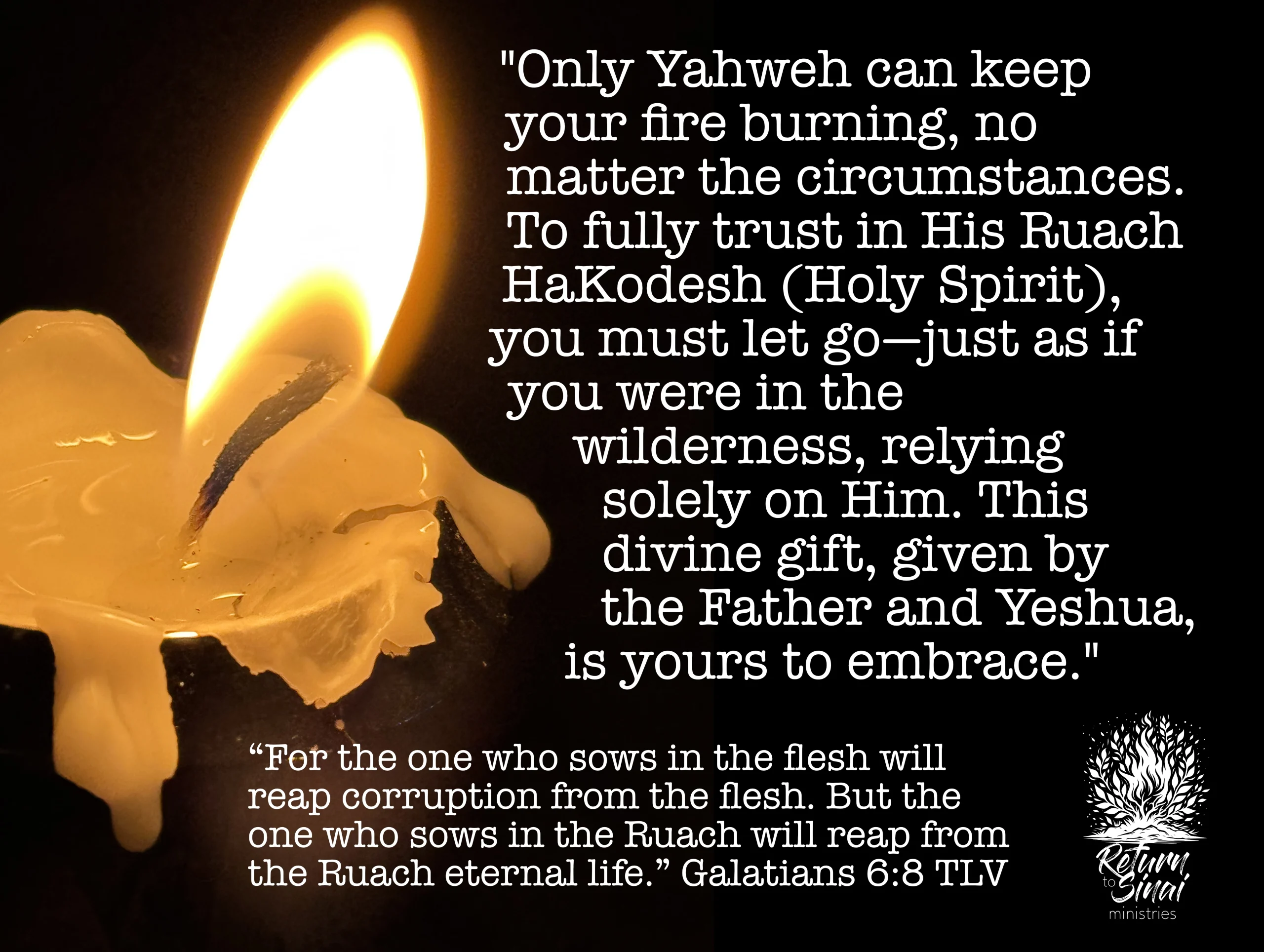We have received the Holy Spirit to guide us through the wilderness.
Galatians 6:8–9 CJB ~ Those who keep sowing in the field of their old nature, in order to meet its demands, will eventually reap ruin; but those who keep sowing in the field of the Spirit will reap from the Spirit everlasting life. So let us not grow weary of doing what is good; for if we don’t give up, we will in due time reap the harvest.
Sometimes, it can be challenging to fully understand Paul without considering the broader narrative of the entire Bible. Paul did not initiate a new movement; rather, he built upon and advanced the existing promises of God’s covenant. When Paul speaks about living in the Spirit rather than in the flesh, he is not referring to the Torah or the Mosaic Law.
And this is extremely important. If we do not grasp this, we risk completely overlooking the true reason behind Yahweh’s grace toward us.
You see, Paul diligently followed the commission he received in Acts 15—to proclaim the Gospel of Yeshua, the message of salvation and redemption from sin. Unfortunately, up to now, our rituals—whether pagan traditions or Torah observance—have not fully achieved this. Why is that?
First, pagan beliefs lack true power and wisdom and ultimately lead to spiritual demise. The Torah was not given as a means of salvation; rather, salvation was offered by Yahweh through the Passover Lamb. Ultimately, salvation is available to us through Yeshua the Messiah. The Torah served as a code of principles and commandments designed to guide us in righteous living, initially among the Jewish people and later extended to all nations—the Goyim (Gentiles).
Initially, we have the foundational elements of the law—oral traditions handed down through generations, intended to clarify complex commandments. Over time, these rudiments and doctrines became increasingly obsessive and, in some cases, contradictory to Yahweh’s original instructions—so much so that even the Jews found it difficult to adhere to them.
Acts 15:7-10 CJB ~ “After lengthy debate, Kefa (Peter) got up and said to them, “Brothers, you yourselves know that a good while back, God chose me from among you to be the one by whose mouth the Goyim (Gentiles) should hear the message of the Good News and come to trust. And God, who knows the heart, bore them witness by giving the Ruach HaKodesh to them, just as he did to us; that is, he made no distinction between us and them, but cleansed their heart by trust. So why are you putting God to the test now by placing a yoke on the neck of the talmidim (disciples) which neither our fathers nor we have had the strength to bear?””
Ya’acov, also known as James, concurred with Kefa, and it was ultimately decided not to impose the entire burden of the Torah upon the Gentiles.
Acts 15:13-21 CJB ~ ” Ya’akov broke the silence to reply.” Brothers,” he said, “hear what I have to say. Shim’on has told in detail what God did when he first began to show his concern for taking from among the Goyim a people to bear his name. And the words of the Prophets are in complete harmony with this for it is written,
‘”After this, I will return; and I will rebuild the fallen tent of David. I will rebuild its ruins, I will restore it, so that the rest of mankind may seek the Lord, that is, all the Goyim who have been called by my name,” says ADONAI, who is doing these things.’
All this has been known for ages. “Therefore, my opinion is that we should not put obstacles in the way of the Goyim who are turning to God. Instead, we should write them a letter telling them to abstain from things polluted by idols, from fornication, from what is strangled and from blood. For from the earliest times, Moshe has had in every city those who proclaim him, with his words being read in the synagogues every Shabbat.””
The issue addressed at the Council of Jerusalem in Acts 15 was not rooted in the Torah itself, but rather in the additional traditions and man-made customs that had been imposed upon it. Peter (Kefa), James (Ya’acov), and the early believers concurred that these human traditions should not be propagated or enforced when discipling new followers of Yeshua. This principle is reflected in Paul’s writings to the assemblies of Messiah, where he emphasized adhering to the core message of the Gospel rather than external customs.
This was not a new problem; Yahweh has been addressing this issue since the very beginning of the material realm. From Adam to the Sanhedrin, and now through the Evangelical Clergy, the doctrines of men have obscured and distorted the commandments—His divine sayings.
Fortunately, Yeshua bestowed upon us the Wisdom of Yahweh—the Ruach HaKodesh (Holy Spirit)—who guides us back to the truth.
John 16:12-15 CJB ~ ” “I still have many things to tell you, but you can’t bear them now. However, when the Spirit of Truth comes, he will guide you into all the truth; for he will not speak on his own initiative but will say only what he hears. He will also announce to you the events of the future. He will glorify me, because he will receive from what is mine and announce it to you. Everything the Father has is mine; this is why I said that he receives from what is mine and will announce it to you.”
In the past, we depended on imperfect priests; now, we place our trust in the perfect Shepherd, Yeshua the Messiah, and the divine Wisdom of the Spirit of Yahweh. This comfort is available to all who earnestly seek Him.
Shalom

Leave a Reply